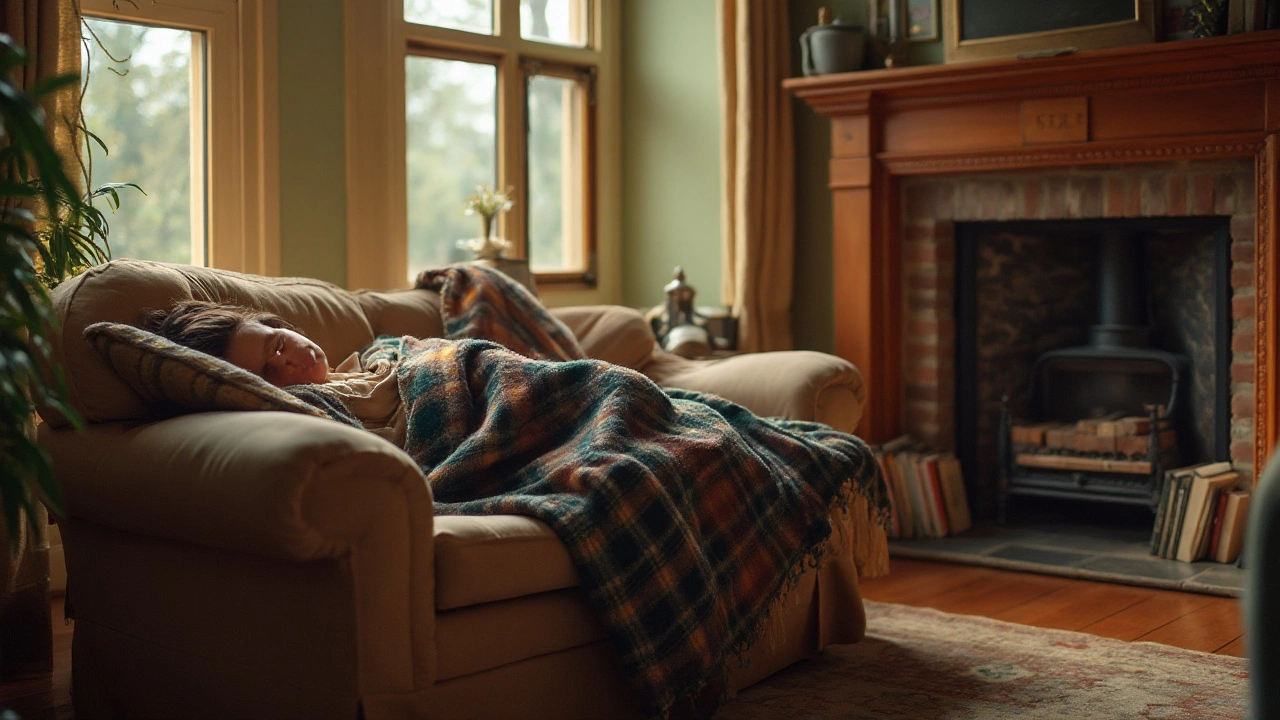There's a certain informal charm to sprawling out on the couch after a long day, isn't there? But when that casual crash turns into a nightly habit, it might be worth a second glance. Many of us have found ourselves lulled to sleep by the alluring comfort of a sofa, yet waking up feeling strangely unsatisfied or uncomfortable.
While the couch can be a sanctuary of comfort for an occasional nap or movie marathon, consistently using it as your primary bed can bring about its own set of challenges. It's not just about comfort, but also how it might affect your posture, sleep, and even your everyday mood.
- Comfort and Design of Couches
- Impact on Health and Posture
- Effects on Sleep Quality
- Tips for Better Couch Sleeping
- When to Consider Alternatives
Comfort and Design of Couches
Couches come in various shapes and designs, each crafted to fit different lifestyles and personal tastes. From sleek, modern lines to opulent vintage patterns, these pieces often become the centerpiece of living rooms, symbolizing relaxation after a bustling day. Yet, when it comes to using them as a primary bed, the comfort and design facets take on a new significance. It's a known fact that most couches aren't designed with nightly sleep in mind, often lacking the ergonomic properties beds are built for. Still, many do provide a level of comfort that can be surprisingly satisfying, albeit more suitable for short-term rest.
The cushion firmness and fabric type are essential considerations when determining if a couch is up for nightly slumber. Softer cushions might seem alluring initially, but they could lead to poor spinal alignment, resulting in morning aches and discomfort. Conversely, overly firm ones might not conform enough to the body, stripping away the cozy respite a sleeper seeks. The fabric also plays a crucial role in creating a conducive sleeping environment. Luxurious leathers might appear stylish but can be sweat-inducing during prolonged contact, whereas breathable fabrics might fare better in temperature regulation. These elements create a sleeping environment that can drastically differ from one couch to another.
In terms of style, sectionals and sofa beds can offer more versatility when it comes to accommodating nightly couch sleep. Sectionals provide ample space to stretch out, reducing the need to curl uncomfortably. Sofa beds, designed specifically with the dual purpose of seating and sleeping, often incorporate a more mattress-like construction, though their comfort can still significantly vary. However, it is critical to acknowledge that even with an expandable bed feature, the mattress support is usually less comprehensive compared to traditional beds, which impacts long-term sleep quality.
Manufacturers have taken note of the demand for more comfortable sleeping solutions and have begun introducing innovations to enhance sofa bed designs. Features such as improved spring systems or memory foam layers aim to mimic the feel of a traditional mattress. Yet, the jury is still out on whether these solutions provide sustainable comfort for nightly use. A Consumer Reports study highlighted that while there's improvement in the category, many sofa beds still fall short of being ideal substitutes for a proper bed.
"For those making the switch from a conventional mattress to a couch, the transition might seem rough at first," notes interior designer Emma Wayfield. "It's crucial to prioritize quality, especially with frequent use."
Ultimately, the decision to sleep on a couch nightly revolves around balancing these design features with individual comfort preferences. Understanding the implications of each design choice—from fabric to firmness—can help potential full-time couch sleepers make an informed decision. If the arrangement isn't working, tweaks like additional padding or back-support cushions might offer some respite. However, these adjustments typically present a temporary solution for something that may require a more substantial change.
In many ways, the couch becomes a canvas for enhancing personal living spaces. Yet, when it's pressed into service as a bed, its original purpose is stretched, both literally and figuratively. So, ponder carefully the choice of couch, considering not just its aesthetic appeal, but its capacity to offer a night of restorative rest, especially if it's destined to be more than a fleeting retreat in one's home.
Impact on Health and Posture
Sleeping on the couch might sound like an easy hack for cramped apartment dwellers or impromptu sleepover hosts. Yet, the habit can gradually become a silent saboteur of your health and posture. While a cozy evening spent dozing off may seem harmless, the cumulative impact can reveal itself over time. Sofas, with their plush cushions and supportive backs, might seem like the ultimate nighttime partner, but they lack the dedicated support of a traditional bed. Couches are primarily designed for sitting, not for lying flat over an extended period. Their design often leads to awkward sleeping positions that can misalign the spine and neck, causing discomfort that creeps into waking hours.
Consider the state of one's spine, a miraculous support system that benefits greatly from a flat, supportive surface during sleep. A properly aligned spine during sleep maintains the natural curvature of the back, a feat less feasible when one is bundled up on a couch. Regularly sleeping on an uneven or crammed surface can lead to chronic back pain, stiff necks, and even headaches upon waking. It’s a discomfort that millions can attest to, particularly in the lumbar region, often the toughest part when it comes to couches. The compression of pillows and cushions under the body, versus the structured resistance of a mattress, further exacerbates these issues over time, with some unknowingly slipping into enduring pain.
Delving into the realm of postural mishaps, it's important to note the spillover effects that poor positions can have on your well-being. Habitual abusers of the couch might notice twinges in the neck, discomfort in their shoulders, and even misalignments sneaking their way down to their hips and knees. This cascade of consequences is compounded by the reality that most couches can't provide the alignment or movement support as your body shifts throughout the night. Like a generation of tech-aided bad posture, couch sleeping can unlock a Pandora's box of nagging ailments that refuse to quiet down during daily activities.
A study published in the Journal of Physical Therapy Science highlights how consistent poor sleeping posture contributes not only to immediate discomfort but can also form long-standing health issues that thread through one's daily life. As Alistair McAlpine, a physiotherapist, once stated, "The sofa is indeed a fine perch for evening relaxation, but when the sun rises, you'd rather your comfort came without strings attached to pain." These remarks echo the sentiment shared by health professionals worldwide who stress the importance of a proper sleeping setup.
The journey to optimizing couch-oriented slumber should prompt serious consideration of health ramifications. Introducing some supportive cushions, using firm pillows for head and neck alignment, and rotating positions periodically can offer relief to impromptu couch sleepers. Yet, the looming question remains: is a night on the couch worth these pains, especially when consistent, quality sleep is so integral to holistic health?

Effects on Sleep Quality
Many of us underestimate the impact our sleeping environment has on the overall quality of our rest. When it comes to sleeping on a couch every night, it's important to acknowledge how this habit might interfere with getting a good night's sleep. One key factor is the couch's design, which is typically not optimized for long periods of sleep. Unlike a bed that maintains an even firmness throughout, a couch can have uneven cushions and awkward spaces where the back meets the seat. Over time, this lack of support can lead to interrupted sleep due to discomfort, potentially waking one up in the middle of the night, diminishing the overall rest received.
Actually, sleep quality isn't solely about feeling comfortable. It's also deeply tied to the body's circadian rhythms and stages of sleep, from light to deep and REM. Consistently sleeping on a couch might disrupt this natural cycle, as the couch can cause frequent shifts and turns while looking for a cozy position. This restless behavior prevents the body and mind from reaching the deepest, most restorative levels of sleep. One could wake feeling groggy or with an aching back, wondering why they weren't able to rest as well as hoped after what seemed like a full night's sleep.
Dr. Michael Breus, a renowned sleep expert, mentions that 'sleeping in a dedicated space that is dark, cool, and quiet plays a significant role in achieving quality rest'
Another aspect that can't be ignored is the psychological association our brain makes between spaces and activities. Bedrooms and beds are often linked with rest and relaxation, easing our mind into a sleep-ready state. In contrast, couches are generally associated with waking activities like watching TV or socializing, which might inadvertently keep the mind stimulated. This overlap of function could delay the onset of sleep there's supposed to be, leaving someone feeling wide awake when their head hits the pillow — or, in this case, the couch cushion.
For those who need to sleep on a couch frequently, it's crucial to mitigate these impacts. One way is by making the environment as conducive to sleep as possible, such as dimming the lights and setting a regular sleep schedule. It's also beneficial to use comfortable sleeping accessories like plush blankets and supportive pillows to mimic a more bed-like environment. Ensuring that the room is cool and minimizing noises can also be just as essential in achieving more comfort and easing into better sleep. These steps can help trick the brain into recognizing the couch as a legitimate place for sleep, fostering improved rest over time.
Ultimately, while catching the odd nap on the couch isn't likely to harm, turning this into a nightly routine isn't recommended without adjustments. Your body may find itself yearning for the support and luxury that a good mattress on a sturdy bed frame can offer. Still, if a couch is the only option available, addressing these factors will certainly contribute to healthier sleep habits and potentially even improve that experience without necessarily having to jump back into a traditional bed.
Tips for Better Couch Sleeping
For those who find themselves sleeping on the couch regularly, a few adjustments can make a world of difference. The sofa bed may not be your orthopedic dream, but there are tricks to minimize a morning full of aches. First, consider the couch's surface. Many couches lack the necessary support for a good night's sleep, mainly if they're too soft or too firm. A quick fix could be using a mattress topper or a suitable cushioning layer. It helps to even out the surface, providing better overall support.
Next, pay attention to your sleeping position. Just like sleeping in a bed, maintaining a healthy sleep posture on the couch is crucial. Try resting on your back with a pillow under your knees to reduce stress on your spine. If you're a side sleeper, place a pillow between your knees to keep your hips aligned. Avoid sleeping on your stomach, as it can strain your neck and back.
Invest in good quality pillows, maybe using ones with memory foam for optimal neck support. It's impressive what a difference the right cushion can make in enhancing sleep quality when you're tucked away on your sofa. Good pillows can maintain your spine's natural curvature, reducing discomfort. And, don't overlook the temperature and lighting. A cozy blanket helps regulate body warmth, and dim lights can set the right mood for slumber.
Cleaning your couch regularly is another often overlooked tip. Dust and allergens can accumulate, impacting one's ability to breathe comfortably during sleep. Therefore, make a habit of vacuuming and airing your cushions to keep them fresh. For added comfort, personalizing your couch sleep setup with items like a weighted blanket or your favorite throw can make it feel more bed-like.
"A good laugh and a long sleep are the best cures in the doctor's book," as asserted in an old Irish proverb, highlighting the importance of undisturbed rest, even if it is on your couch.
Lastly, don't forget to evaluate your couch's longevity. If you're going to sleep on it regularly, make sure it's holding up well under consistent use. Cushion degradation could signify the time to consider upgrading to a fortified sofa bed or a new couch with better support.

When to Consider Alternatives
At some point, you might find yourself asking: Is this couch truly the best option for nightly sleep? Even the coziest of sofas was first designed for sitting, not sleeping. Over time, certain unmistakable signals might indicate that it’s time to explore alternatives. When experiencing chronic back pain or discomfort that lingers long after you wake, these could be your body's subtle hints that your couch might not be providing the necessary support for restful sleep. It’s easy to dismiss a poor night of sleep here and there, but prolonged unease should raise red flags.
Many people may not realize that the lack of proper cushioning and contouring leads to muscles and joints entering awkward positions. This is more than a fleeting annoyance; it might gradually snowball into more significant complications later on. Experts note that when individuals frequently resort to their sofas as makeshift beds, they might develop misalignments in their spine and neck due to inadequate support. Highlighting these health concerns can underscore the importance of rethinking couch sleeping as a regular habit. A study published in the Journal of Chiropractic Medicine noted that extended periods in the wrong sleeping posture could exacerbate pre-existing conditions like arthritis or sciatica.
"The human body craves alignment and support during sleep," says Dr. Linda Harrington, a prominent back health specialist. "Without it, the risk of wear and tear significantly rises."
If reaching a point where proper sleep seems elusive, yet circumstances compel you to continue sleeping on a couch, small adaptations might improve your situation. Consider mattresses or foldable tops made specifically for enhancing couch sleeping experiences. These products might deliver the needed support that cushions alone can’t provide. Alongside these assistance products, engaging in physical activities or exercises that focus on strengthening the back may prevent habitual aches from turning into acute pains.
Alternatives to Consider
- Invest in a sofa bed that offers a blend of lounge comfort and the structure of a proper mattress.
- Incorporate memory foam toppers or cushions that adjust to your body contours while resting.
- Avoid sleeping directly on uneven surfaces wherever possible, relying on structured padding.
- Prioritize healthy sleep hygiene, implementing regular sleep hours and minimizing disturbances.
- Contemplate redesigning your bedroom to accommodate a real, supportive bed if possible.
Ultimately, it's about weighing what fits your needs and circumstances, recognizing any adverse effects, and making informed choices regarding nightly sleeping arrangements. A couch might be a comfortable ally now, but listening to your body's cues could make a world of difference, steering you towards healthier sleep practices.


Write a comment